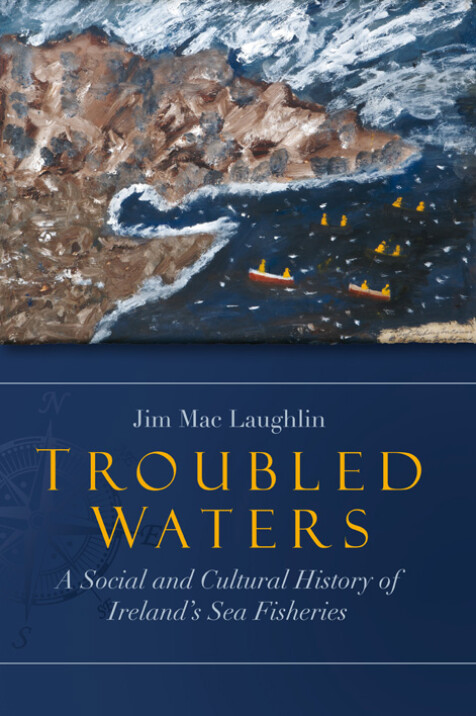Troubled waters
A social and cultural history of Ireland's sea fisheries
Jim Mac Laughlin
‘As a social and cultural history of Ireland’s sea fisheries – and not just an examination of Ireland’s failure to harness the potential of her sea fisheries – Troubled Waters provides a tremendous insight into everything pertaining to the sea and fish in Irish history … Troubled Waters has instantly become the standard text on the history of Ireland’s sea fisheries ... [it is] an authoritative piece of work; considered, comprehensive and deeply analytical', Mícheál Ó Fathartaigh, Irish Literary Supplement (Fall 2012).
‘Troubled Waters is a fascinating account of Ireland’s coastal communities through the ages … It took four years to research and write this comprehensive book … Jim’s aim in writing this book was to treat the history of coastal Ireland as more than a footnote to national history and to rescue fishing communities from political marginalisation and from historical oblivion. And he has. It’s academic in its sweep and its detail, but he tells a great story and there’s lots to interest people here in Galway', Judy Murphy, Galway City Tribune (August 2010).
‘Once in a while, genealogists and local historians are fortunate to discover real gems and, without doubt, Troubled Waters falls into that category … this book is wonderfully written by a political geographer who has published widely on migration, colonial history, racism, ethnic conflict, nation-building and social theory … an excellent read!', Michael Merrigan, Ireland’s Genealogical Gazette (Septemeber 2010).
‘Dr Jim Mac Laughlin’s Troubled Waters is the most comprehensive study of the history of sea fishing in Ireland to date and rightfully pays homage to the country’s fishing communities. In refusing to treat inshore and deep-sea fishing as mere footnotes in the evolution of Irish society, Dr Mac Laughlin’s study stresses the historical importance of the coastal economy to the country’s maritime communities', Seán P. Feeny, Donegal News (August 2010).
‘A fascinating, fact-packed read, from the hunter-gatherers on Stone Age shores through the Newfoundland adventures of Waterford’s cod fishermen to a final betrayal of their calling at the birth of an Irish Free State … [t]his book fills a remarkable gap in the national story … what gives it a special intellectual salting is in seeking fateful causes beyond the usual matrix of colonialism’, Michael Viney, Irish Times, WeekendReview (January 2011).
‘[This book] concerns not just the economics of Ireland’s sea fisheries, but also the industry’s cultural and societal situation through the ages … this intense study of Irish fisheries illuminates a colourful subculture that, for long periods, became a symbolic vessel tossed about in ever more choppy waters, taking on more and more water', Mary McWay Seaman, The Celtic Connection (April 2011).
‘A most welcome addition to the literature on fisheries history [and] an impressive scholarly study that explains why fisheries and fisheries history has often been marginalized or even completely neglected by historians as well as contemporary decision makers ... the most relevant contribution to fisheries history is definitely the well framed and argued discussion on the reasons for the marginalization of the Irish fisheries within Ireland … Altogether the book is a highly welcome addition to the bookshelf of every maritime historian as well as an important contribution to Irish history', Ingo K. Heidbrink, Nautical Research Journal (Winter 2011).
‘This is a very valuable book. Every page is full of detail regarding the history of Irish fisheries and of Irish fishing communities … this book should be required reading for anyone interesting in the history of Irish fisheries both for its factual detail and for the author’s stimulating arguments', Mark Hennessy, International Journal of Maritime History (2011).

